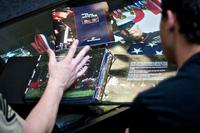As President Donald Trump's tariffs strain numerous international relationships, Gen. Chance Saltzman, chief of space operations, emphasized on Wednesday the importance of building strong defenses in space.
"Space power is the ultimate team sport. The domain is too big, too complex, too dynamic for a single nation to secure," Saltzman said during the Space Symposium at The Broadmoor.
Space has also grown in complexity with 15 countries capable of launch and 88 nations with satellites in orbit, some with unclear intentions.
Nations interested in working with the U.S. in space will soon have a guiding document, an international partnership strategy, Saltzman announced, to help inform the best ways for them to contribute to the overall space ecosystem. The document will be released in the next week or so, he said.
He would like to see fully integrated systems between nations, integrated policies and training, common standards and strategies. He would also like to see more joint exercises and exchange of personnel.
The Space Force's work in South America where the guardians have worked together with Argentina, Ecuador, Peru, Brazil and Colombia exemplifies the kind of work he would like to see globally. The team used a surveillance, reconnaissance and tracking program to share unclassified information and helps ensure all the partners are staying out of each other's way.
They are also delivering results, he said. So far they have supported detecting and tracking drug trafficking, assisted with disaster relief and helped Peru identify satellite jamming from China and Russia.
It's an area of key concern for the U.S. because China is expanding its influence in the region over ports, space facilities and 5-G communications, House Armed Services Committee Chair Mike Rogers, R- Ala., said in an April meeting.
New Zealand is another key example of a quality partnership, hosting the highest number of U.S. space launches outside America, said Judith Collins, the country's first space minister. The country has moved quickly since establishing a space agency in 2016, sending its first experimental sample to the International Space Station last year. The project offered insights into synthetic biology research and the manufacturing of pharmaceuticals, she said.
The country's researchers now plan to work with NASA on 12 Earth observation studies, Collins said.
"Our relationship with NASA continues to offer new opportunities to show how a small space agency like we have can work with the best in the world," she said.
One of the challenges to international partnerships is classification and while the process to lower the classification of more information to facilitate more information sharing is ongoing, Saltzman said, the process is slow.
"The burden of proof is on the person that wants it lower in classifications to prove that it won't cause any harm or any issues for other collateral operations," he said, in a briefing with the media
But the completed work to declassify threats on orbit could help in the near-term with the development of an unclassified wargame that could take place globally, explained Saltzman and Air Marshal Paul “Godders” Godfrey, assistant chief of space operations for future concepts and partnerships. Such a game could take place across different time zones and different days, helping to replicate real-world challenges, Godfrey said.
© 2025 The Gazette (Colorado Springs, Colo.). Visit www.gazette.com. Distributed by Tribune Content Agency, LLC.














